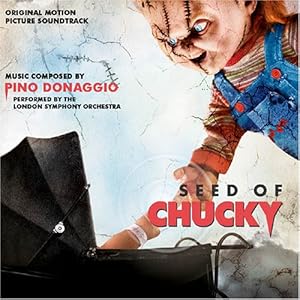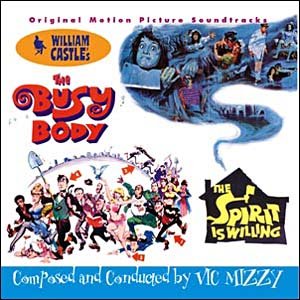Don't make me call it Shocktober: vol. X

A group of thieves has pulled off a daring robbery, but they are betrayed and robbed by one of their own. Whilst seeking him in farm country, they run across some scarecrows. Of course, those scarecrows are harmless, right? Not a bad hook for an 80s horror movie and there's atmosphere to spare, but the film gets more ridiculous as it goes along, refusing to explain its leaps of nonsense.
This was the first score to be composed by Terry Plumeri under his own name (and, apparently, he'd ghostwritten 20 scores for other composers up to that point; anyone know of these titles?). The film's low budget and an interest in the sparse scoring of "The Twilight Zone" led to the use of a mere 13-piece orchestra. The "Main Titles" introduce two melodies: a creepy, repeating piano figure with pounding two-note statements in the foreground and a wavering string motif that effectively convey the isolation the characters face.
Chirping string runs and a contra bass clarinet reading of the wavering motif distinguish "Running for the Plane", while "The Clearing of Bert's Head" features a lonely flute and hypnotic plucked strings.
Even with the occasional hooting of the contra bass clarinet, "Waking Up" is a beautifully placid cue, string and harp figures setting a peaceful mood. "You Want the Money?" bounds along with chopping strings and the wavering motif.
"The Man Stuffed with Money" introduces a foreboding tympani to its collection of orchestral effects. Creepier still is the slowed-down wavering motif that makes its way through "The Conference" and "The Truck with No Engine".
"The Return" marks a return of sorts to the opening title, with the piano and wavering motifs reunited once again. There's also a sort of danger motif for squealing clarinet, chopping strings and rolling piano, figuring into "Through the Woods", "Barbed Wire Daddy" and "The Last Phone Call".
The amusingly-titled "How Are We Gonna Live in Mexico...if We're Dead?" strips away the foreground effects from the piano motif, leaving a wonderfully minimalist (and unnerving) piece of scoring. "The Getaway" tosses in snare drums and low-end piano as the characters make their escape. However, "Death on a Plane", with its forlorn strings and pounding tympani, shows that all will not be flowers and sunshine.
At the time of this writing, there are less than 50 copies left at Intrada. Don't hesitate to pick this up.
Labels: reviews, Terry Plumeri









